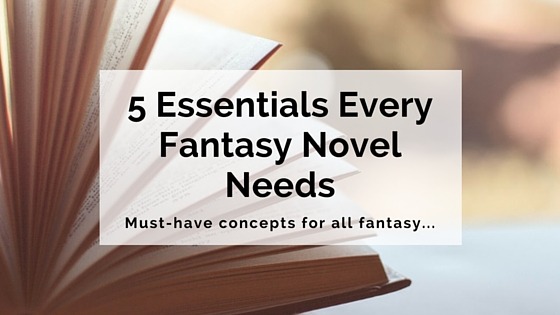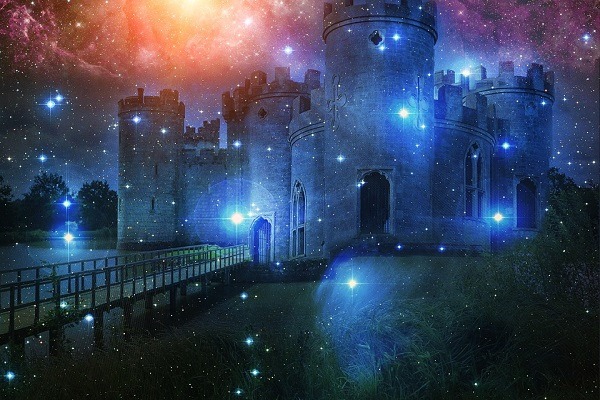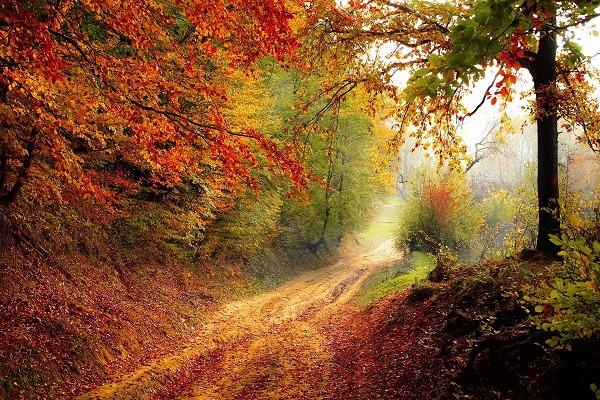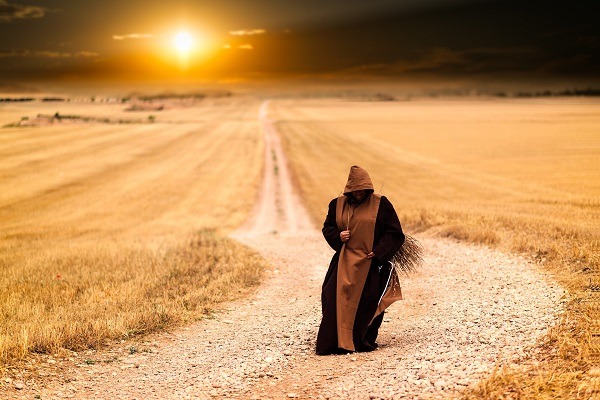So you want to write a fantasy novel. You’re enamoured with epic sagas from the likes of Tolkien, Martin and Rowling; you love everything about the genre, and you feel that you have your own fantasy story to tell.
But this is a complicated genre to write in. While there aren’t hard-and-fast rules to follow, there are certain elements that must be included for a story to be classified as ‘fantasy’. However original your story may be, it does need to fit somewhere within the genre if you’re going to attract an audience.
Don’t have time to read the whole guide right now?
No problem. Let us send you a downloadable PDF so you can read it when it’s convenient for you…
Fantasy readers expect certain things from the books they consume. And no, we’re not talking about common tropes like elves, dwarves, trolls and dragons! We’re referring to much broader elements – general concepts within which you can be as inventive and imaginative as you like.
So without further ado, let’s take a look at the five essential elements every fantasy novel needs.

1. A magic system
This is the element that sets fantasy fiction apart from other genres. For a story to be considered ‘fantasy’, it needs to contain some sort of magic system. But what exactly do we mean by this?
In short, a magic system refers to things that occur or exist in your story that do not or cannot exist in the real world. Elements of sorcery, witchcraft and enchantment; fantastical creatures and the supernatural; advanced abilities or powers… Basically, anything with no basis in real-world evidence or logic can be considered ‘magic’.
This is where you can really set your story apart from others in the genre. If your magic system is completely unique and imaginative, if it’s something readers haven’t seen before, your novel has a point of difference.
An innovative, intriguing magic system is often the key to helping your novel stand out in the saturated fantasy market.
Your magic system should play a key part in your story. Whether it’s a source of conflict (see more on this below), a driving plot force, or a means for character development, magic is of vital importance in every fantasy novel. But it can’t be treated merely as a convenient plot device; your magic system needs to have established rules, and it needs to follow them.

To get an idea of what constitutes a well-developed magic system, take a look at the works of some established fantasy authors.
George R. R. Martin’s A Song of Ice and Fire series contains some standard magical elements such as dragons, prophecies and the resurrected dead, but the complex way he weaves these elements together makes for compelling and original fantasy.
Patrick Rothfuss’ Kingkiller Chronicles, on the other hand, involves a unique magic system that is almost more like a science. The central story revolves around people known as arcanists, who practise arts like alchemy, ‘sympathy’ (a type of energy manipulation) and ‘naming’ (wherein someone discovers the ‘true name’ of a thing and therefore can control and command that thing).
As you’ll see when you dip into the vast canon of fantasy literature, there’s no end to the creativity and originality that can be channelled into a magic system.

Stay up to date with the most popular posts on Writer’s Edit.
2. A well-developed setting
This is another absolutely vital element within fantasy fiction. When you’re writing in this genre, your story takes place in a completely new world. (And even if your fantasy is based on Earth, it’s not the Earth we actually know.) In order to immerse readers in your world, you must develop your setting thoroughly and thoughtfully.
In fantasy writing, this process is often referred to as world-building. J. R. R. Tolkien is often viewed as the original master world-builder; the depth and detail with which he created the world of Middle-earth is unparalleled. Everything from language to societal customs to history and lore is explored throughout The Hobbit, The Lord of the Rings and supplementary texts such as The Silmarillion.
Now, don’t intimidate yourself by comparing your world-building to that of a master like Tolkien! Remember that the world of Middle-earth was his life’s work, and he spent years and years developing it. When you’re writing your first fantasy novel, it’s best to start small and build your world from the ground up.

Here are a few things to consider when starting the process of developing your setting:
- What does it look, sound and smell like? Consider things like landscape, climate, man-made structures and people’s appearances.
- What are its people like? Are there distinct groups or classes? How does society operate?
- Who holds the power in your world? (More on this point below.)
- Where do your characters fit into the world?
There are plenty more aspects to consider when developing your setting. Check out our Ultimate Guide to World-building for an in-depth look at how to approach the process.

Get Your Free Fiction Writing Download Bundle Now
Containing over 20,000 words in total, the bundle is packed with advice on getting your novel planned, written, edited and published. Plus, join our email list to stay up-to-date.
3. A cast of complex characters
As with any novel, it’s often the characters in fantasy fiction that truly get readers invested in the story. Your setting, plot and magic system may intrigue and engage readers, but none of these aspects matter if your readers don’t care about the characters and their outcomes.
How many characters your story contains is entirely up to you, but if you’re writing a series (as the majority of fantasy writers are), it’s better to have a cast of several main characters, as well as your auxiliary characters. This provides interest and diversity within the story, helping to sustain readers’ engagement over multiple books.
However, to sharpen focus and encourage reader empathy, you might like to consider having one ‘standout’ main character, with whom your readers will experience the majority of the story. Alternatively, if your story is extra complex and your cast of characters especially large, you may wish to have more than one of these main characters.
A good example of the latter technique is Sarah J. Maas’ Throne of Glass series, which mainly sticks with the viewpoint of main character Celaena, but expands into multiple viewpoints as the series grows in scope and complexity. (See our article on how to master alternate points of view for more on managing multiple POV characters.)

No matter which method you choose, the key thing to focus on is creating complex, flawed, believable, relatable and realistic characters. Even though your story takes place in a fantasy world, your characters should still be viewed as ‘real people’, and developed as such within the narrative.
Another of the most important things to remember when writing fantasy characters is to avoid clichés. If possible, steer clear of overused fantasy tropes, such as the farm boy who is really the ‘chosen one’ or the old, wise wizard/mentor. Unless you can breathe fresh air and originality into these character types, it’s best to avoid them entirely.
Take a look at the results from a recent poll about the top fantasy characters of all time. There’s a wide range of different types of characters here, from Death in Terry Pratchett’s Discworld series, to George R. R. Martin’s Arya Stark, to Locke Lamora of Scott Lynch’s Gentleman Bastards.
While not definitive, this list gives you a good idea of the endless potential there is for developing original fantasy characters that will truly resonate with your readers.
4. A central conflict
The key to every good story is conflict. This is especially true in fantasy fiction, where the stakes are often higher for your characters, and the story usually stretches across multiple books in a series.
There are a few types of conflict you can (and should) explore within your story:
- Inner conflict, experienced by your characters;
- Small-scale conflict, experienced between your characters;
- Large-scale conflict, in which your characters are up against a powerful external force.
While these different conflicts are all important, it’s vital to have an overarching central conflict within your fantasy novel or series.
The Harry Potter series is a great example of conflict in fantasy fiction. While each book contains its own internal conflicts, the series as a whole deals with one central conflict: that between the boy wizard Harry and the evil Lord Voldemort. This conflict ties all seven volumes of the series together and keeps the story moving forward at all times.
A note of caution: don’t be tempted to write in conflict just for the sake of it – for example, in the form of an unnecessary extra battle or fight scene. While you want to keep your readers engaged and excited, introducing conflict purely for the sake of creating some action will make the story seem forced and unnatural.
Focus instead on exploring conflict organically. Consider the consequences of characters’ actions and follow them on their natural course. All conflict must have a believable cause.

5. A power structure/system of government
In every fantasy world, there must be an established power structure. This usually refers to a system of government within the world. (The only exception to this is if you’ve created a world in which the ‘system’ is actually complete anarchy, but this would lead to pure chaos and might prove difficult to shape into a coherent story.)
To work out your world’s system, begin by asking one simple question: who holds the power within this world? It might begin with a single ruler, such as a king or queen in a monarchical government; it might be a high council of magical people; it might be a religious entity.
Whatever you choose, it’s vital to decide who holds the most power in your world, working your way down from there to create a power structure or hierarchy, and deciding where your characters fit into the mix.
This is a key part of world-building, as it gives structure to your fictional society. It can also be used to raise the stakes for your characters and create plenty of all-important conflict.

To help you develop your power system, it’s often useful to conduct some research into real-life systems of government in different cultures and periods of history. You can use these aspects of reality as a basis for your own system, or incorporate different elements here and there to create a unique hybrid system.
For further inspiration, take a look at this summary list of different societal structures and consider which might work best within your world and story.
For more specific guidance, consult this list of world-building questions related to social organisation. Asking yourself a few key questions about how your world works will help you get to the heart of your society and the power structure within it.
Finally, as always, it’s helpful to study successful examples from fantasy literature. A key example is the complex politics and power plays in Martin’s Song of Ice and Fire series, which are perhaps the most driving force in its plot and constitute a great example of how to incorporate a system of government with maximum impact.
***
So there you have it! If you’re thinking about starting a fantasy novel, be sure to consider these elements in your planning process. If you’ve already started writing, take a look back over your story and see whether all these elements are included in some way.
With these five key ingredients, you’ll be well on your way to creating a wonderful fantasy world filled with magic, conflict and compelling characters.
Happy writing!
26 responses to “5 Essential Elements Every Fantasy Novel Needs”
Thank-you Claire for writing this. I actually started writing a fantasy novel this year which has been stuck in my mind for four years now. This article is a great guide for any beginner writer of a fantasy work.
As I am, too, going for writing future, I’m interested in knowing what genre do you like writing in and I’d love to talk about books and writing.
Best Wishes,
Anamika 🙂
Hi Anamika,
Thanks so much for your comment! That’s awesome that you’ve started writing your fantasy novel, and I’m so glad you found this post helpful.
As for what I like to write – well, you may have guessed, but I’m an aspiring fantasy writer myself! It’s my favourite genre, and I’m currently working on my first attempt at a novel as well.
I’d love to chat books and writing with you too! Are you on Twitter? You can find me at @ClaireABradshaw over there – let’s follow each other!
Best of luck with your writing. 🙂
– Claire
A good summary. We all need maps, of lands and seas, of people and their histories, even if we don’t put them in the story. We still need to have them in our heads.
Climate is something even famous authors sometimes forget. Years ago I was reading an Andre Norton Witchworld when suddenly we were told the characters were cold. And I realised that was the first time any mention had been made of temperature in that or any other Witchworld story I had read. From then on I made sure I knew what the weather was like. But I forgot the wildlife. Lots of weather, but no birds. Some day, if I ever have time to go back and revisit that book, there will be a monster rewrite.
Now my son is writing his own, rather violent, fantasy novel, first draft done, and looking at his first revision.
Keep up the posts, good sound advice.
Hi Andy,
Thanks so much! Totally agree with you there. Those sometimes-forgotten details like weather/wildlife etc. can often help go the distance and make our worlds truly feel real. Congrats to your son on his first draft – wishing him (and you) all the best with the writing!
I’ve definitely gone overboard to the typical standard I think, especially when it comes to world building. I want it all to be as realistic as possible. So I have designed a planet strictly according to scientific principle to be the setting of my stories. I methodically made maps for the climate, vegetation, elevation, landforms (hills, plateaus, mountains etc.), Warm and cold ocean currents, tornado, hurricane, and volcanic zones, along with tectonic plates. I went so far as to chart precisely when and where in the sky my four moons would be visible in the sky from anywhere on the planet, and what phase they would be in. I’ve also accounted for the tidal strength of each moon.
This is also of course includes the design of 20 major cultures on my world complete with their political, economic, religious, and social organization structures.
It’s taken decade using my spare time here and there to complete. I developed the plotlines of a 16 book Anthology during that time, and have finally begun. But now anytime I’m wondering what the weather, vegetation, and wildlife are like, I have a reference to prevent all contradiction in the matter. It also provides for very precise travel time from point to point. This method wouldn’t work for someone wanting to be a professional writing career, at least early in life, but my perfectionism won’t allow me to do it any different.
Hi Michael,
Wow – it sounds like you’ve created a truly incredible world! The level of detail you’ve covered sounds amazing (and no wonder, after ten years’ persistence). All the best of luck for the writing of your anthology. I’m sure all the hard work you’ve done on world-building will pay off and you’ll be thanking that inner perfectionist 🙂
Your world sounds amazing great work could you give me some tips on making my world has realistic as possible?
Hi Ella,
Michael’s world does sound fantastic, doesn’t it? If you’re looking for some tips on world-building, you might want to check out our Ultimate Guide here: https://writersedit.com/the-ultimate-guide-to-world-building-how-to-write-fantasy-sci-fi-and-real-life-worlds/
Good luck!
Claire
I have always wanted to write a fantasy novel for teens, and these tips are great! Since this is my first time writing a book, I especially like your advice on having a good power structure. I think I would have forgotten about this until I have already written too much!
Hi Marisol,
Thanks for your comment and glad you found the article helpful! A power structure, and often the struggle for power, are such important factors in bringing a fantasy world to life.
Since you’re writing for teens, you might also be interested in some of our articles about young adult fiction:
https://writersedit.com/fiction-writing/ultimate-guide-ya-fiction/
https://writersedit.com/fiction-writing/write-compelling-young-adult-fiction/
https://writersedit.com/fiction-writing/how-to-master-conflict-in-young-adult-fiction/
Best of luck working on your first novel!
-Claire
Thank you so much, Claire. I wanted to write a story, just for fun, in the style of Sword Art Online, mixed with Harry Potter, and the stereotypical Grand Quest theme. This helped so much as a starting point, because i was feeling a little overwhelmed in my own thoughts and ideas. I have decided to just get a sheet of paper and jot ideas down. The journey of one thousand miles starts with the first step. Right?
Again thanks a billion,
Nick
Hi Nick,
You’re very welcome! Totally understand feeling overwhelmed before starting – but you’re absolutely right: you’ve just gotta start somewhere. Glad to hear this post has helped you do that 🙂
Best of luck with your story – it sounds like a lot of fun!
-Claire
Hello Claire!
I wanted to use your 5 key points in a paper that I am writing about the fantasy genre, but in order to use this as a source I need the date published. Would you be able to inform me whe this was published? Thanks!
Hi Erin,
This post was published on the 4th of July 2016 🙂 All the best with your paper!
-Claire
Thank you very much for creating this article. Helped bring out a few points I might need to address further.
You’re very welcome, Philip! Hope it helps you in your fantasy writing 🙂
my favorite fantasy book is “The Land Of Stories” By Chris C
olfer
Thanks for this! It really helped my English more at home and school! U R Paw-some!
Good to hear, Sandra!
Enjoyed this post! People always complain about fantasy tropes, but what I personally loved about fantasy is how really good authors play with those tropes! I am 5 chapters in writing my first attempt at a fantasy novel and you never realize how much thought goes into these masterpieces until you start to write. It is quite daunting, actually. I love how limitless fantasy can be though, as it will go as far as your imagination can take you. Thanks for writing this!
Hi Hayden,
So pleased you enjoyed the post! Totally agree about playing with tropes and the limitlessness of fantasy – and also how difficult it is to write! Wishing you all the best with your novel. 🙂
Claire
I’m going into my sophomore year of high school, so I’m not entirely sure if I CAN write a decent story; however, I’ve tried before on a website called Wattpad when I was fourteen. My first book had zero plot, so I kind of stopped writing when I was told it was really confusing and terrible (I knew it was bad myself, but kept going for some reason). My second one was a little better, according to the readers and my real-life friends, but I still unpublished it from Wattpad just because it deteriorated into boring chapters of nothingness because I didn’t know how to end it. Hopefully this’ll help, since I plan to write another one (on a different account, since people most likely know what to expect when they see I’ve published a new book online). I’m just bad at outlining, making decent characters, and world-building. So, I suppose the Internet is my best resource now.
I’m rambling now, so… yeah. 🙂
Hi Laurel,
Plenty of successful writers got their start on platforms like Wattpad, so you’re in good company there! It sounds like you’re lacking in confidence a little, but don’t worry – every writer is. 🙂
If you’re interested in improving your craft in the areas you mentioned, we have a few articles that might help:
Outlining/planning – How to Outline Your Novel in 11 Easy Steps, Everything You Need To Know About Planning Your Novel and Planning Your Novel Using the Three-Act Structure
Character development – 5 Quick Tips for Crafting Believable Characters, 5 Key Questions to Ask About Character Motivations and Create Compelling Characters with These 3 Character Arcs
World-building – Ultimate Guide
Hope this helps, and best of luck with your writing, Laurel! 🙂
Thank you for writing this, i am actually starting a fantasy book of my own, but at the get go, people said that i was just a stupid teenager, and that i should give up, but after reading this, i got encouragement that i, a thirteen year old, could write a book. Thank you.
Hi, Claire,
I just came across your article and I couldn’t agree more. A fantasy novel has to be engaging at every turn of the page. There is, however, one question that I want to ask you. In the last point, you mentioned that a power structure is important for a fantasy story. However, if the MC(s) are on a quest, then is a power structure still required for that story? For example, if I’m a character and the present day earth is my fantasy world, and if I’m on a journey then I will come across various governments/power structures that may not necessarily function in the same way. Also, I may not be influenced by a specific power structure until and unless something happens in a particular country or land.
Btw I’m working on my second book which is a YA fantasy adventure. My first book, Seven Sundays, is a fiction/self-help and will release in a month or so.
Thanks in advance. Cheers!
Hey Claire,
I loved your article!! It really helped me in my writing process. I have just started writing a draft for a fantasy novel and i got a great head-start because of this post. I am just a 13 year old aspiring writer with a very extensive plot, stumbling with a writer’s block almost every two days, but I think that Writers Edit is really helping me through it. I would love to share my plot and ideas with you. I also have a book review blog called Fantasy Maniac. You can check it out, but anyways, Thanks a lot!!!